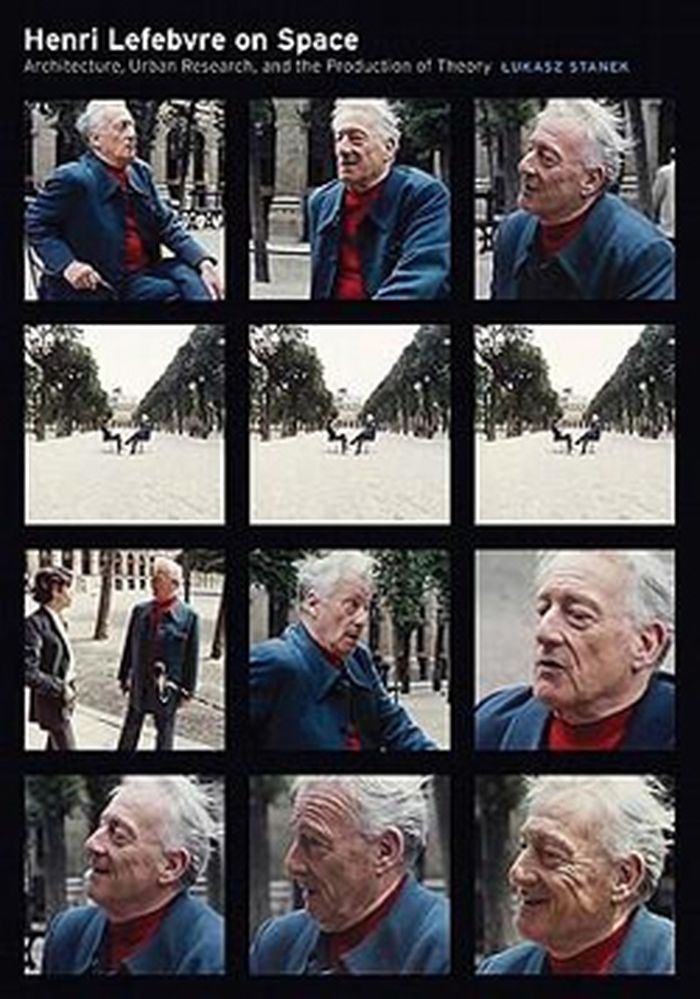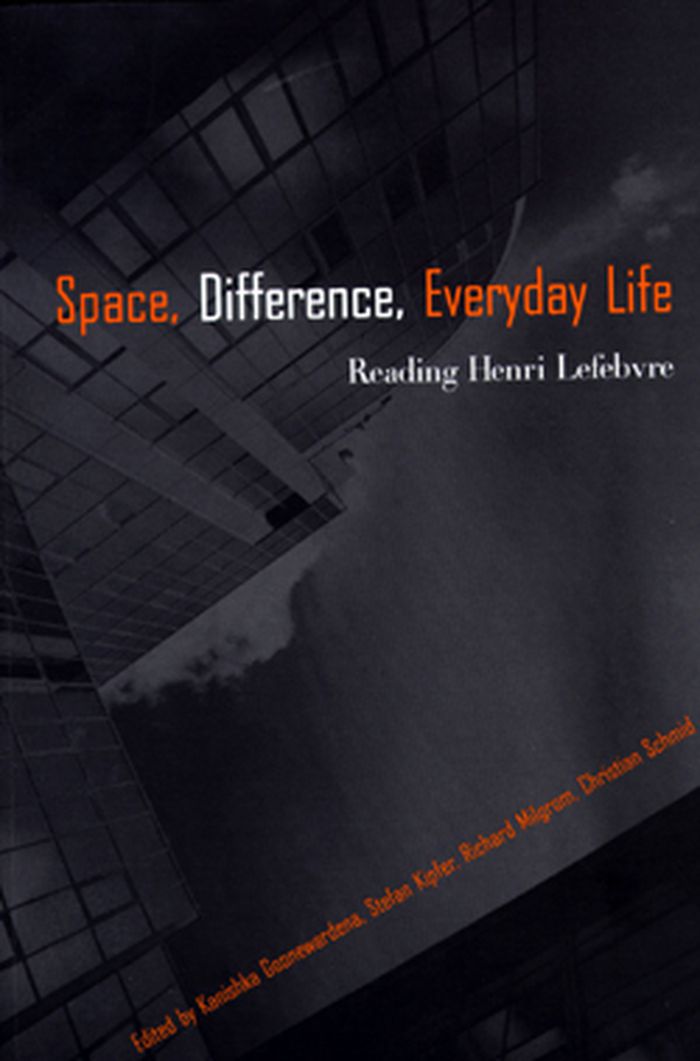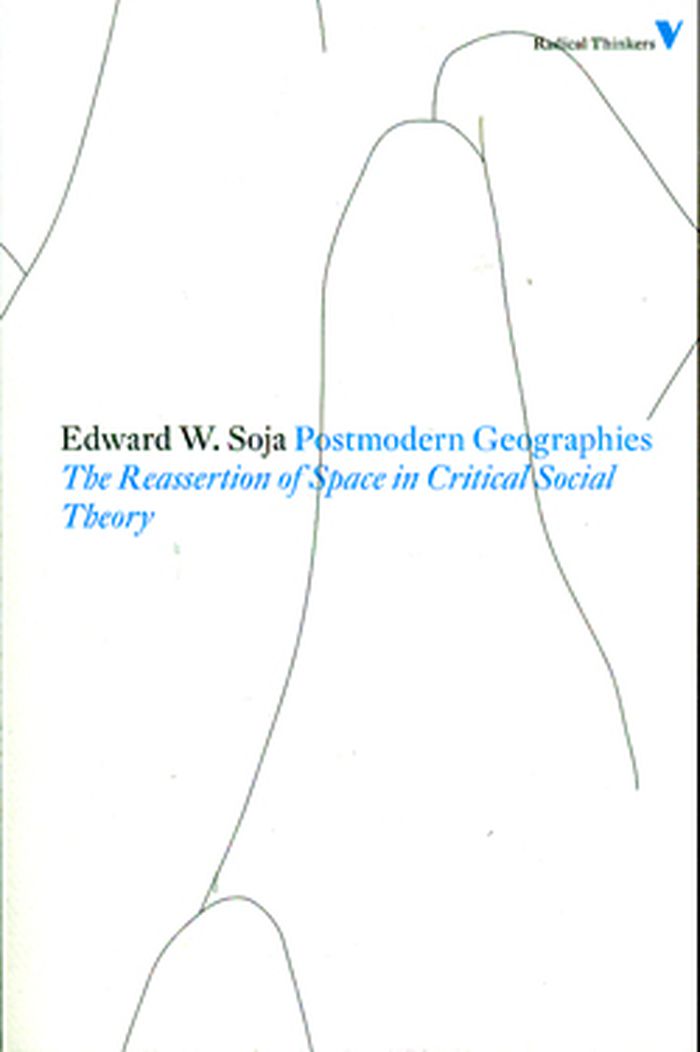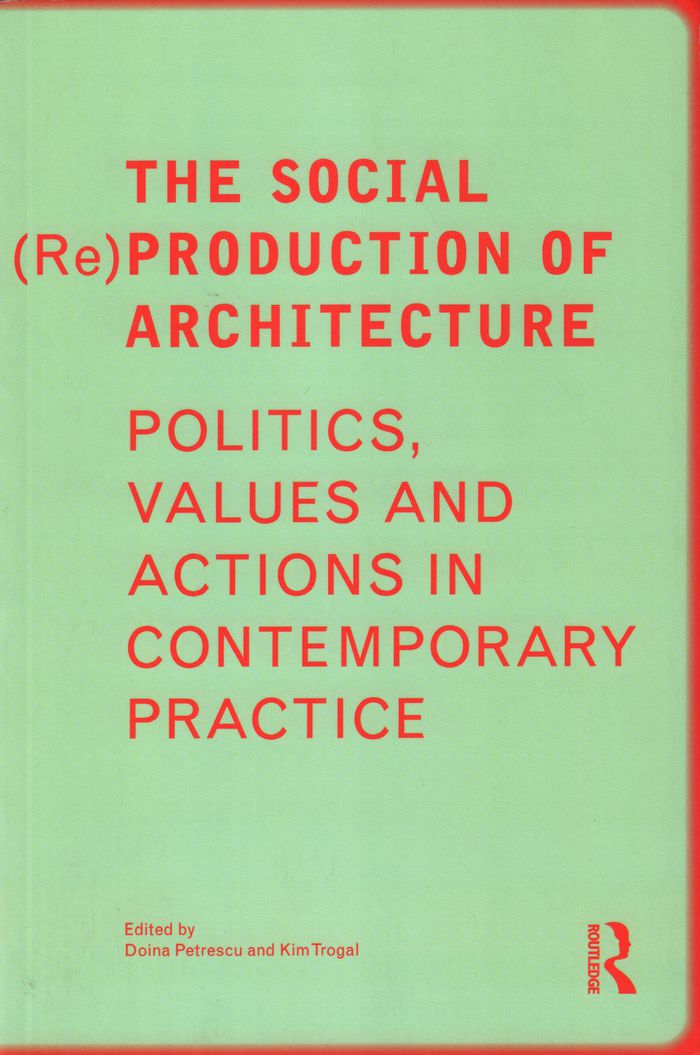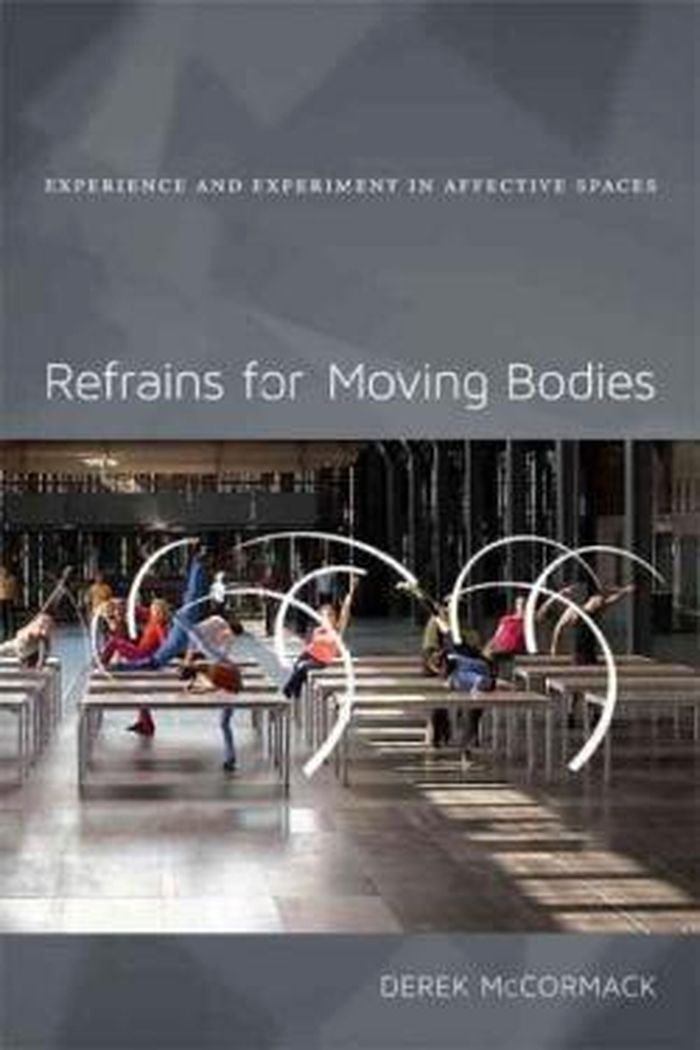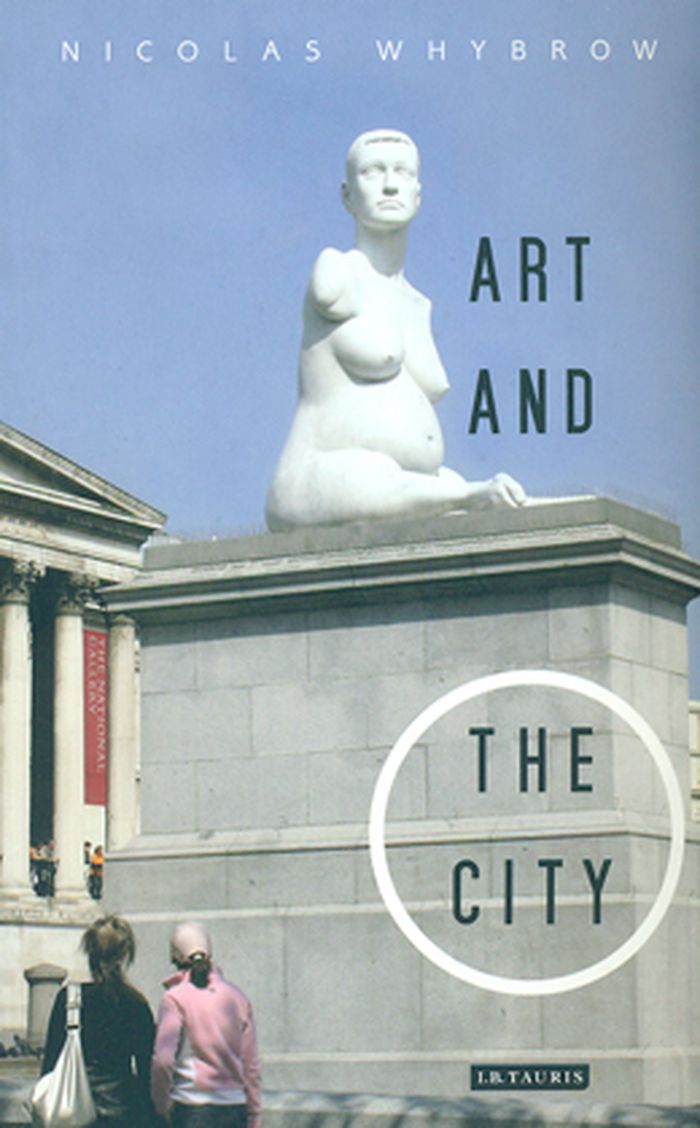$41.99
(available in store)
Summary:
Countering the prevailing view, which reduces Lefebvre’s theory of space to a projection of his philosophical positions, Stanek argues that Lefebvre’s work grew out of his concrete, empirical engagement with everyday practices of dwelling in postwar France and his exchanges with architects and planners. Stanek focuses on the interaction between architecture, urbanism,(...)
Henri Lefebvre on space: architecture, urban research, and the production of theory
Actions:
Price:
$41.99
(available in store)
Summary:
Countering the prevailing view, which reduces Lefebvre’s theory of space to a projection of his philosophical positions, Stanek argues that Lefebvre’s work grew out of his concrete, empirical engagement with everyday practices of dwelling in postwar France and his exchanges with architects and planners. Stanek focuses on the interaction between architecture, urbanism, sociology, and philosophy that occurred in France in the 1960s and 1970s, which was marked by a shift in the processes of urbanization at all scales, from the neighborhood to the global level. Lefebvre’s thinking was central to this encounter, which informed both his theory of space and the concept of urbanization becoming global.
Architectural Theory
$43.95
(available to order)
Summary:
One of the most influential Marxist theorists of the twentieth century, Henri Lefebvre pioneered the study of the modern state in an age of accelerating global economic integration and fragmentation. Shortly after the 1974 publication of his landmark book The Production of Space, Henri Lefebvre embarked on one of the most ambitious projects of his career: a consideration(...)
State, space, world, selected essays
Actions:
Price:
$43.95
(available to order)
Summary:
One of the most influential Marxist theorists of the twentieth century, Henri Lefebvre pioneered the study of the modern state in an age of accelerating global economic integration and fragmentation. Shortly after the 1974 publication of his landmark book The Production of Space, Henri Lefebvre embarked on one of the most ambitious projects of his career: a consideration of the history and geographies of the modern state through a monumental study that linked several disciplines, including political science, sociology, geography, and history. State, Space, World collects a series of Lefebvre’s key writings on the state from this period. Making available in English for the first time the as-yet-unexplored political aspect of Lefebvre’s work, it contains essays on philosophy, political theory, state formation, spatial planning, and globalization, as well as provocative reflections on the possibilities and limits of grassroots democracy under advanced capitalism.
Architectural Theory
$61.50
(available to order)
Summary:
Lefebvre’s massive body of work has generated two main schools of thought: one that is political economic, and another that is more culturally oriented and poststructuralist in tone. Space, Difference, and Everyday Life merges these two schools of thought into a unified Lefebvrian approach to contemporary urban issues and the nature of our spatialized social structures.
Architectural Theory
August 2008, New York, London
Space difference, everyday life: Henri Lefebvre and radical politics
Actions:
Price:
$61.50
(available to order)
Summary:
Lefebvre’s massive body of work has generated two main schools of thought: one that is political economic, and another that is more culturally oriented and poststructuralist in tone. Space, Difference, and Everyday Life merges these two schools of thought into a unified Lefebvrian approach to contemporary urban issues and the nature of our spatialized social structures.
Architectural Theory
$25.95
(available in store)
Summary:
This publication contests the tendency, still dominant in most social science, to reduce human geography to a reflective mirror, or, as Marx called it, an "unnecessary complication." Beginning with a critique of historicism and its constraining effects on the geographical imagination, Edward Soja builds on the work of Foucault, Berger, Giddens, Berman, Jameson and, above(...)
Postmodern geographies: the reassertion of space in critical social theory
Actions:
Price:
$25.95
(available in store)
Summary:
This publication contests the tendency, still dominant in most social science, to reduce human geography to a reflective mirror, or, as Marx called it, an "unnecessary complication." Beginning with a critique of historicism and its constraining effects on the geographical imagination, Edward Soja builds on the work of Foucault, Berger, Giddens, Berman, Jameson and, above all, Henri Lefebvre, to argue for a historical and geographical materialism, a radical rethinking of the dialectics of space, time and social being. The author charts the respatialization of social theory from the still unfolding encounter between Western Marxism and modern geography, through the current debates on the emergence of a postfordist regime of "flexible accumulation." The postmodern geography of Los Angeles, exposed in a provocative pair of essays, serves as a model in his account of the contemporary struggle for control over the social production of space.
Critical Theory
The social (re)production of architecture: politics, values and actions in contemporary practice
$76.90
(available to order)
Summary:
''The Social (Re)Production of Architecture'' brings the debates of the 'right to the city' into today’s context of ecological, economic and social crises. Building on the 1970s' discussions about the 'production of space', which French sociologist Henri Lefebvre considered a civic right, the authors question who has the right to make space, and explore the kinds of(...)
The social (re)production of architecture: politics, values and actions in contemporary practice
Actions:
Price:
$76.90
(available to order)
Summary:
''The Social (Re)Production of Architecture'' brings the debates of the 'right to the city' into today’s context of ecological, economic and social crises. Building on the 1970s' discussions about the 'production of space', which French sociologist Henri Lefebvre considered a civic right, the authors question who has the right to make space, and explore the kinds of relations that are produced in the process. In the emerging post-capitalist era, this book addresses urgent social and ecological imperatives for change and opens up questions around architecture's engagement with new forms of organization and practice. The book asks what (new) kinds of 'social' can architecture (re)produce, and what kinds of politics, values and actions are needed.
Architectural Theory
$95.00
(available in store)
Summary:
“Contested Spaces, Counter-narratives, and Culture from Below in Canada and Québec” explores strategies for reading space and conflict in Canadian and Québécois literature and cultural performances, positing questions such as: how do these texts and performances produce and contest spatial practices? What are the roles of the nation, city, community, and individual(...)
Architecture in Canada
February 2019
Contested spaces, counter-narratives, and culture from below in Canada and Quebec
Actions:
Price:
$95.00
(available in store)
Summary:
“Contested Spaces, Counter-narratives, and Culture from Below in Canada and Québec” explores strategies for reading space and conflict in Canadian and Québécois literature and cultural performances, positing questions such as: how do these texts and performances produce and contest spatial practices? What are the roles of the nation, city, community, and individual subject in reproducing space, particularly in times of global hegemony and neocolonialism? And in what ways do marginalized individuals and communities represent, contest, or appropriate spaces through counter-narratives and expressions of culture from below? Focusing on discord rather than harmony and consensus, this collection disturbs the idealized space of Canadian multicultural pluralism to carry literary analysis and cultural studies into spaces often undetected and unforeseen – including flophouses and "slums," shantytowns and urban alleyways, underground spaces and peep shows, and inner-city urban parks as they are experienced by minorities and other marginalized groups. These essays are the products of sustained, high-level collaboration across French and English academic communities in Canada to facilitate theoretical exchange on the topic of space and contestation, uncover geographies of exclusion, and generate new spaces of hope in the spirit of pioneering works by Henri Lefebvre, Michel Foucault, Michel de Certeau, Doreen Massey, David Harvey, and other prominent theorists of space.
Architecture in Canada
books
$74.95
(available to order)
Summary:
The Unknown City takes its place in the emerging architectural literature that looks beyond design process and buildings to discover new ways of looking at the urban experience. A multistranded contemplation of the notion of "knowing a place," it is about both the existence and the possibilities of architecture and the city. An important inspiration for the book is the(...)
Urban Theory
June 2000, Cambridge, Mass.
The unknown city : contesting architecture and social space
Actions:
Price:
$74.95
(available to order)
Summary:
The Unknown City takes its place in the emerging architectural literature that looks beyond design process and buildings to discover new ways of looking at the urban experience. A multistranded contemplation of the notion of "knowing a place," it is about both the existence and the possibilities of architecture and the city. An important inspiration for the book is the work of Henri Lefebvre, in particular his ideas on space as a historical production. Many of the essays also draw on the social critique and tactics of the Situationist movement. The international gathering of contributors includes art, architectural, and urban historians and theorists; urban geographers; architects, artists, and filmmakers; and literary and cultural theorists. The essays range from abstract considerations of spatial production and representation to such concrete examples of urban domination as video surveillance and Regency London as the site of male pleasure. Although many of the essays are driven by social, cultural, and urban theory, they also tell real stories about real places. Each piece is in some way a critique of capitalism and a thought experiment about how designers and city dwellers working together can shape the cities of tomorrow.
books
June 2000, Cambridge, Mass.
Urban Theory
$42.00
(available to order)
Summary:
"The Unknown City" takes its place in the emerging architectural literature that looks beyond design process and buildings to discover new ways of looking at the urban experience. A multistranded contemplation of the notion of "knowing a place," it is about both the existence and the possibilities of architecture and the city. An important inspiration for the book is(...)
Urban Theory
October 2002, Cambridge, Massachusetts
The unknown city : contesting architecture and social space
Actions:
Price:
$42.00
(available to order)
Summary:
"The Unknown City" takes its place in the emerging architectural literature that looks beyond design process and buildings to discover new ways of looking at the urban experience. A multistranded contemplation of the notion of "knowing a place," it is about both the existence and the possibilities of architecture and the city. An important inspiration for the book is the work of Henri Lefebvre, in particular his ideas on space as a historical production. Many of the essays also draw on the social critique and tactics of the Situationist movement. The international gathering of contributors includes art, architectural, and urban historians and theorists; urban geographers; architects, artists, and filmmakers; and literary and cultural theorists. The essays range from abstract considerations of spatial production and representation to such concrete examples of urban domination as video surveillance and Regency London as the site of male pleasure. Although many of the essays are driven by social, cultural, and urban theory, they also tell real stories about real places. Each piece is in some way a critique of capitalism and a thought experiment about how designers and city dwellers working together can shape the cities of tomorrow.
Urban Theory
$34.95
(available to order)
Summary:
In Refrains for Moving Bodies, Derek P. McCormack explores the kinds of experiments with experience that can take place in the affective spaces generated when bodies move. Drawing out new connections between thinkers including Henri Lefebvre, William James, John Dewey, Gregory Bateson, Félix Guattari, and Gilles Deleuze, McCormack argues for a critically affirmative(...)
Refrains for moving bodies: experience and experiment in affective spaces
Actions:
Price:
$34.95
(available to order)
Summary:
In Refrains for Moving Bodies, Derek P. McCormack explores the kinds of experiments with experience that can take place in the affective spaces generated when bodies move. Drawing out new connections between thinkers including Henri Lefebvre, William James, John Dewey, Gregory Bateson, Félix Guattari, and Gilles Deleuze, McCormack argues for a critically affirmative experimentalism responsive to the opportunities such spaces provide for rethinking and remaking maps of experience.
Art Theory
Art and the city
$34.50
(available to order)
Summary:
To Henri Lefebvre, the space and 'lived everydayness' of the inter-dependent, multi-faceted city produces manifold possibilities of identifiction and realisation through often imperceptible interactions and practices. Art and the City takes this observation as its cue to examine the role of art against a backdrop of globally rising urban populations, taking into(...)
Art and the city
Actions:
Price:
$34.50
(available to order)
Summary:
To Henri Lefebvre, the space and 'lived everydayness' of the inter-dependent, multi-faceted city produces manifold possibilities of identifiction and realisation through often imperceptible interactions and practices. Art and the City takes this observation as its cue to examine the role of art against a backdrop of globally rising urban populations, taking into account the more recent performative and relational 'turns' of art that have sought in their city settings to identify a participating spectator - an implicated citizen.
